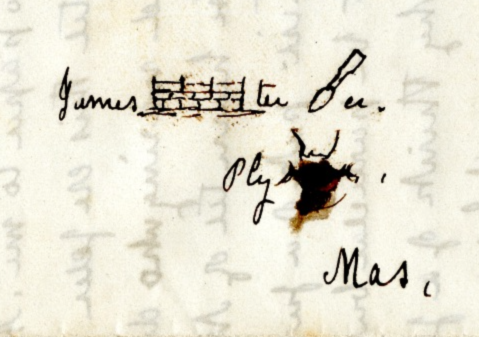This letter is undated. The limited content makes it difficult to accurately assess when it was written, but the tone and illustrations in the address suggest that Esther was young, possibly around 15. Esther (who uses her nickname Esta) may have been writing to her brother in Plymouth while she was away at private school. One clue is that she mentions that James hasn’t sent her paper; in other letters from school she thanks him for sending some. in the Antiquarian Society’s archival collection reveal that in 1848 both James and Esther were tutored by Charles Burton, who became Superintendent of Plymouth’s public schools in the late 19th century. After Ephraim Spooner’s financial position improved in the 1850s, he was able to spend more money on Esther’s education, allowing her to attend school away from home. The misspelled words in this letter are almost certainly intentional, even if Esther were a child. The impression is that she is playfully teasing her older brother by writing him a nonsensical letter. (A “translation” is provided after the transcription.) When contrasted with her other letters, it becomes clear that this one is an outlier. While the letter itself provides few details on Esther’s life in this period, it offers insight into her relationship with James, who was four years her senior.

Ply[drawn mouth]
Mas.
Dear James,
Haint got but jist time to’dite this ere short kinder bilit to you. You say as how . Now just you sing out who did, jist tel this ere feler will you. Ges as how twas my frend waring who did it. but not noing carnt so. I’ve hearn tel of Maflowrs if you se any on um jist puk of a fu down this rode. will you. Needent be particlar but if you have morn you want why think of a feler up this wa what dont has non. I fele very anxus to no who sent that ere to me that yu sa yu did nt send. Cos I shd like to send um 1 bak, cant mak out that are riting no how. He gin up bete. this time. Cant rite no more now cos Ive got to git histry [?] plese excuse oll my bad speling cos I’m very apt to spel rong.
Yrs in grate haighste.
Sistor Estaw
Dear James,
Ain’t got but just time to write this here short [kinder] to you. You say “How?” as you ain’t sent no paper to me. Now, just you sing out who did, just tell this here feller, will you? Guess how: twas my friend Waring [?] who did it. But, not knowing, caren’t so. I’ve heard tell of Mayflowers, if you see any of them, just pick a few down this road, will you? Needn’t be particular, but if you have more’n you want, why, think of a feller up this way what don’t has none. I feel very anxious to know who sent that there ‘Morial to me, that you say you didn’t send. ‘Cause I should like to send ‘em 1 back, can’t make out that writing no how. [He gin up bete. this time.] Can’t write no more no ‘cause I’ve got to get [history?]. Please excuse all my bad spelling, ‘cause I’m very apt to spell wrong.
Yours in great haste,
Sister Esta

